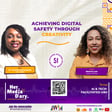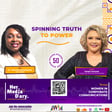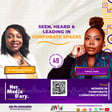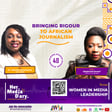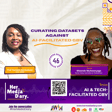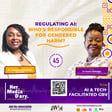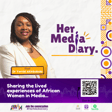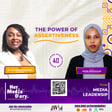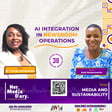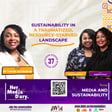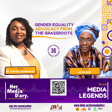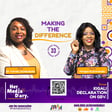Controversial Ad and Initial Reactions
00:00:04
Speaker
In my former place of work, one of our agencies came up with a very beautiful ad of a monkey or a chimpanzee that was smiling. I immediately stood against it because in the first place, people refer to Africans as monkeys. So it's an insult. I fought it. I said, no way. We are not doing this. It's not right. Why should we use a chimpanzee? It's an insult to us. And they said, okay, Sophia, you are right. But you know, we love the chimpanzee.
00:00:32
Speaker
I said, what do you love about it? They said, almost every advert in Ghana has a man or a woman smiling or with their children smiling. But when you have a chimpanzee smiling, it's something extra extraordinary. I thought and thought and thought, and they said, no, we we love the chimpanzee, so so far we agree with you, but we will do it. I was broken. I was like, God, now how am I going to explain this to the public?
00:01:02
Speaker
Imagine a world where we have gender equality in and through media. That is our mission at African Women in Media.
Introduction of Her Media Diary and Guest Sophia Kudjodi
00:01:09
Speaker
I'm Dr. Yemisi Akimobola, your host, and this is Her Media Diary.
00:01:13
Speaker
a podcast that captures the lived experiences of African women working in media industries. In this episode, I'm joined by Sophia Kudjodi, a Ghanaian corporate communications expert with a rich background that spans over two decades. Sophia shares her journey, her challenges, and the lessons she learned along the way from her dynamic childhood in Ghana to becoming one of the top 10 most influential women who have risen to the top in journalism and public relations. Now throughout this series, we will be in conversation with African women who are championing the gender equality cause and ensuring adequate representation of women in corporate communication sector. By inviting these voices into conversation, we hope to provide solutions to break down barriers faced by African women in media industry.
00:02:06
Speaker
Where we start this podcast by getting to know the woman behind the success because we can Google your success, but we want to know your journey. So so tell me about growing up. Did you grow up in Accra?
Sophia's Childhood and Family Influences
00:02:18
Speaker
No, I didn't grow up in Accra. So um I'm the daughter of two police officers.
00:02:24
Speaker
Both my parents were in the police force. So being transferred from one place to the other is one of the things we do a lot. So for instance, I was born in Tamale, the northern part of Ghana, you know, I started school there. And then my father was transferred to Seshios, Western region.
00:02:44
Speaker
My mother was transferred to Greater Akara region, but we were moving between um wherever my mother is, we'll be there for a while, then we'll go to our father's place. The good thing was that when they were together, we were always happy together, but once they separated them. If we are with one person for a long time, you fall sick, then they take you to the other person.
00:03:04
Speaker
ah So, my life had been quite rugged from childhood because we went to were born in Tamale, we went to Temah, Great Acre region, then to Ho, to Seshio or so, or Fuase. These are in different regions of Ghana because of their work. But one thing about me was that growing up, I used to be a very sick person.
00:03:27
Speaker
very, very sick. if But at some point, my parents thought I had a sicker cell. So we did all manner of tests, but I didn't have sickling cell. I was just a frail person, um very weak all the time, you know, and you could hardly get me to talk. And I'm born to a family of my father had nine children. My mother had six.
00:03:52
Speaker
out of the nine and and be hold on nine children wow tell me the dynamics of that setup nine children so my father already had his three children before he got married to my mother so but my mother is this beautiful one who had all the the other children living with us So we we all grew up together, who up and that knowing each other so well. And we're we're just family. There was nothing like those children or those children, but we all we all grew up together. yeah And it was such a beautiful setting. I tell people today that when I hear testimonies about us and how we relate to others, I want to give thanks to my mother,
00:04:35
Speaker
who taught us to work together as a family. You know, I know families where parents, you know, pitch one against each other. But my biggest cheerleaders are my siblings and my nieces and nephews. And it's it's it's such a beautiful thing that I think that as I grow, I realize that it's something you can't take for granted because apparently it's not a giving. It doesn't just come like that.
00:04:58
Speaker
You know, so yeah. Absolutely.
Challenges and Family Dynamics
00:05:01
Speaker
Can you tell me some of your earliest memories and that kind of family dynamic of, you know, always moving around? I mean, it sounds like you had a really good tour of Ghana, to be honest. But was that how it felt at the time? Not quite. Not quite.
00:05:14
Speaker
It didn't feel like that at all. um But um because my father and my mother were separated by their work, we always found ourselves looking forward to my father coming most of the time. So my but my father was this funny, interesting guy, always there for his children. And we were five girls.
00:05:36
Speaker
You know, my mother said we have five girls and and one boy. on My father said we have seven girls and two boys. And so he'll come home and he he loves to keep things clean. My father can't step on the ground where there is sand.
00:05:52
Speaker
So he has to wear his slippers. And we were just these three atoms running around ah the place and all that. So he would always go like, oh, you girls, what is wrong with you? what does And he would cook for you. And whenever he's coming, normally we eat together as a family. But whenever he's coming into town, my mother would not mind us again. She just sticks to her husband.
00:06:14
Speaker
to go to the market together, do the cooking together. It was such a beautiful thing. We grew up before we realized that, oh, there were challenges in that marriage. We didn't see it. You know, there were challenges, serious challenges, but it was a beautiful thing. I remember when my father would wake up in the morning, come out and say, guys, be on the outlet. She's not in a good mood today. and and oh i Watch out. And then he used to call her,
00:06:42
Speaker
I know, for some old laws, it's on the rampage right now, so be careful. ah But he calls it. My sweetheart, is there is a word in Ghana called Odoi Wu, like, love is death. And that's how he called my mother. After his passing 40 years ago, my father's family still call my mother Odoi Wu. So no it didn't feel like a tour of Ghana at all. It was kind of a punishment. It sounded to us because you start school here,
00:07:11
Speaker
And then you have to break and go to school there. And then you have to go and start all over again and then you move again. So we didn't have till today, I meet people like, oh, you were my mate. And I can't even remember that, oh, okay, we went to school together. So you tell me, I was like, okay, ok ki ok okay, okay. So it's it's kind of messed up a bit with our education.
00:07:32
Speaker
But if eventually, my
Leadership Style and Family Values
00:07:34
Speaker
mother settled after the passing of my dad. My mother settled in the voter region. So then we had a longer period to school. But what I was saying was that and the family dynamics, there was so much fun in the house. it was My dad always had something to joke about. He would make a joke about everything, a lot of encouragement. you know And my mother i was this hardworking woman, disciplinarian.
00:07:59
Speaker
So you can't have it your way. you know So as my father is making fun, teasing and all that, then my mother, the animal for support laws, then we'll come in with a discipline we've had discipline and all that. So today when you go out and people are like, oh, wow, we are very you are a lady, you are this. And then I sometimes call her and I said, da qua thank you very much. They say I am this and it's because of you.
00:08:28
Speaker
You know, but it's it's it's taught me a lot of family philosophy. So even in my corporate life from when I started work till today, um I treat my team as a family. I love to encourage a lot. I am a very stern person. I'm firm.
00:08:45
Speaker
But they know, I speak a lot of my eyes and I speak a lot of my tone of voice because that's what I learned from Annam Fassaboh, my mother. But then people who know me know that, oh, I'm very affable, very sociable, always welcoming, very warm. And that's why I love to mentor a lot of young people. But they also know that ah behind us smile is a very tough disciplinarian who will not let you have it your way at all, if I think it's not right. But it helps me to be able to engage young people a lot.
00:09:21
Speaker
It helps me a lot because I'm quite old school because I'm trained from this old mother, children training, sit down, don't do this, do that and all that. And we obey the values and everything that we picked in the house. But at the same time, it helps me to appreciate the young ones of today.
Career Aspirations and Journalism Path
00:09:40
Speaker
And so I try to encourage more because I see what encouragement has done in my life. I tell people, and my father has been gone for almost 40 years. I think this year is 40th year since my father passed. But we talk about him in my house as if it happened yesterday.
00:09:58
Speaker
it because of the impact he had on our lives. I, for instance, I said earlier, I used to forsake a lot. And one of the days I called him and I said that, you know what, I want to stop school so that you use your money to take care of my other siblings. And he goes like, well, you know, you are the only graduate in my house.
00:10:19
Speaker
and And I was then in the secondary school. And if it means you have to attend school once in a year, and I have to sell everything to take you to school, I would do it. Because this is a home. I'm talking about police officers. My mind was not about money because there was no money in the house. We didn't even realize it. All we knew was that there was always food.
00:10:39
Speaker
There was always something to wear, and there was always fun. We always had something in that house to laugh about. Every day, every day to today. We remember back in the days and we always have something in that house to laugh about. And so he encouraged us. My father was the one that is like, you never do any wrong with him.
00:10:58
Speaker
You know, so for instance, you break something and you are crying and you come in, it's like, oh, don't worry. I mean, I've been trying to get a new one, but I didn't know how to dispose of this old one. Once you have broken it, now you have given me the opportunity to buy a new one. So that is the kind of encouragement that has built some confidence in us that you live your life humble, content,
00:11:22
Speaker
And after all, loving everybody around. I tell people, my mother receives more calls from my old students, my schoolmates, than I do. Because she would call me. She would call you. She's 86 years now.
00:11:39
Speaker
But she will call you. On her bare days, sometimes our friends give the puzzles to her because they are like, well, so far you never called me. She sees the one who's been calling me. So that has been my life. And so today she will call you out of the blues. How are you doing? Have you eaten? I have some stew, come for something. you know that's That's my mom for you, a very generous woman. And so she's taught us to be like that.
00:12:08
Speaker
No, I mean, it's clear to see from what you say what impacts your both your parents have had in terms of who you are today. And I'm interested to know how you found yourself in journalism because you first decided your journalism career at the Gannon News Agency. Gannon News Agency, yes. So um both parents have not been to the secondary school. But my my father used to say that wherever his father took him to school, too, he would push you to the next level.
00:12:36
Speaker
yeah And he passed when I was in the secondary school. I was going to write my mock exams. you know so ah But my mother called one of the teachers to come to the house and advise me on what courses to do because I kept saying that I want to be a journalist a lawyer or a bilingual secretary, you know. And so this person comes to advise and says, do this course, do that course, do that course. So I agreed and I did it. And I really wanted to go to the university. I got to a point, I always say this, and I say my my f French is very bad, but I say I was silly. That's the French I'm speaking in in thinking that it was going to be the university or nothing else.
00:13:21
Speaker
university or suicide. It was that terrible because my father had been calling me his graduate before he passed. So I thought that until I go to the university, I'm not a graduate. And I could cry and cry and cry and cry about this.
00:13:38
Speaker
and until a friend said, look, there is this institute of journalism where they are admitting students. Why don't you try it? And I said, no, no, no, no, no, no, no, no. no My father used to call me, his it's called Le Gon Bruni, like the the ah white girl from the university. So that's what I wanted to be for him.
00:13:57
Speaker
So to veer off that was not good. for I didn't want it. So he he had to go and pick the phone and i forced he forced me to go and write the entrance exams and everything and did the journalism. Eventually I did journalism and then I started work and kind of started enjoying it.
00:14:14
Speaker
you know, because when I started, we used to do what you in Nigeria is called youth service. We call it national service. During my national na service period, I worked with some people and they liked the attitude. So one day I was there and then somebody comes to me and is like, oh, Sophia, we have these guys in town who want to come and do, it's a Danita sponsored project and they need a journalist. I was like, oh, no, no, no, no. I'm just a youth service person. I'm just a national service person. I can't do it. He said, no, no, no, Sophia, I know you. You can't do it.
00:14:44
Speaker
Because I had seen people and who had done 20 years of journalism, 15 years of journalism, and I got a bit scared. But he said, no, you are the one we want, because I've worked with you before. And even then, so so he called me and I go to do this, became like a consultancy I was doing for the people, and I will call everybody for help and all that.
00:15:07
Speaker
ah But at the time, I had still not started my journalism because there was a ban on employment. But after two years of doing that, I had an opportunity to interview with Ghana News agency Agency because even though I was doing a consultancy, I was still going to Ghana News Agency to sell. OK.
00:15:24
Speaker
yeah for nothing but i was doing it i was i just wanted to learn you know so i went i kept going there until two years after they're like okay the opportunity is now there for employment so quickly i applied and they were like well you're already with us and but you're already doing this thing why why do you want to come here i said no this is the best place to learn so i went to Ghana News Agency to work as a reporter you know, but eventually resigned as a senior reporter along that line. How many years were you there for? I was there for six years. Was there any pivotal moments during that period that kind of shaped now the direction that you took? yeah Yes, yes. I was in the voter region and I was the only lady amongst guys and so wow and I was this tiny almost kind of no form, no shape kind of human being.
00:16:22
Speaker
You know, but the guys taught me to be tough. I mean, I remember going for assignments with them and they would say that, look guys, we are all wearying here. And I'm like, there's a lady amongst you guys. We all are not wearying at the same place. I said, well, hurry up, find something because when we move, we are not stopping again.
00:16:41
Speaker
You know, but I call it my days of wearing jeans. I mean, I didn't even think about dressing and all that. I was so much into the guys, you know, and they did something. They encouraged me a lot. They encouraged me a lot. and And then they pushed me to go and do a bit of radio. There was a community radio, even though I was working with Ghana newspapers, which is like a wire service, you know, like the routers and all that. They pushed me to go and do radio, you know, women's program,
00:17:11
Speaker
a youth program and election
Sophia's Journalism Impact and Career Growth
00:17:14
Speaker
period. They would make me to go and interview aspiring MPs and all that. So that toughened me. en know And then there was something that happened at a point in time. They said some people wanted to come and offload some chimpanzees that had be useful four that had been used for experiments outside the country. They wanted to bring them to the voter region.
00:17:39
Speaker
And some of us had to go to the grounds, do investigations, and write a very strong you know article to say that this is not happening. It is not coming here because chimpanzees have their own problems. How much more you know being tested, you can't tell what has been it has been test has been tested on them. So we fought back, and it did not happen. And it was one of my you know high moments and in journalism.
00:18:05
Speaker
But that was around the time when internet was coming. And I got excited about what internet ah computers and all that. So I had to go and learn by myself how to do. I don't know if you you know about MS-DOS and Excel. I studied all that by myself, CorelDRAW and all that. Yeah. And then I did a story a story about the British Air Commission at the time. And they were shocked that this tiny little girl in that community, in that in that part of the country could write such a story, no fears, no hold bars. You know, I wrote it as it is. And it was like, wow.
00:18:50
Speaker
So you couldn't even send her the story. This girl must be a tough one. So they said they were looking for people to work at the High Commission and to do websites. And if I was interested, I should, I should apply and I applied and I got it.
00:19:07
Speaker
Okay, so that's how you then went into communications. Exactly, exactly. But all along, even all this while, I was still doing the consultancy for the organization. It was the Water Region Community Water and Sanitation Agency. So i kept I kept doing the consultancy for them, and but still I failed to know until I'm doing the actual work that I want a desire to do. i't said so yeah So after this time I transitioned into the British High Commission, but I went there as a website editor under the Press and Public Affairs you know Department. And when I got there,
00:19:45
Speaker
I cited their website. I was also doing stakeholder engagement for them, helping with their relationship with the police and the media. And that went very, very well. I'm interested to know how your experiences as a journalist right influenced what you then wanted to do in PR and strategic communication.
00:20:04
Speaker
I think what helped me a lot in in in transitioning from journalism into communication is the stakeholder engagement, and the writings, the press releases, and all that. Because I have done that over, I've done stories over and over again. I know what will be attractive and what will not be attractive. So for me, what it has helped me in doing is my storytelling. you know It's helped in shaping my storytelling, doing narratives.
00:20:30
Speaker
you know stakeholder engagement because you had to meet all manner of people and the way you engage with them and all that helped you to build partnerships you know and and you know when it comes to strategic communication it's all about how you engage with people it's communication is not about you it's about how you communicate for people to make meaning out of what you're saying So if I say something and you can't, it doesn't mean anything to you. I haven't said anything. It's like talking to you and speaking in tongues. I'll be talking all right. But you'll be wondering, is she okay? So that's what communication is all about. So for me, I tell people that public relations and communications should be a kind of foundational thing for everybody.
00:21:20
Speaker
because it helps you to relate better with people and with your stakeholders, customer you know customer service and all that. It all comes together through what I learned in journalism and in the work that I was doing.
00:21:37
Speaker
Hello media enthusiasts, we've got some great and exciting news. The African Women in Media Conference 2024 is coming to Dakar, Senegal. From the 5th to the 6th of December this year, the event will gather some of the brightest minds and influential voices in media across the continent and beyond.
00:21:57
Speaker
but Why should you attend? Well, Album24 offers incredible benefits. Firstly, you get to learn directly from leading media professionals, thought leaders and innovators who are driving change in the industry. Next, you'll connect with fellow journalists,
00:22:13
Speaker
content creators and media professionals and academics who are as passionate about storytelling and change making as you are. You'll discover new career pathways, gain valuable insights and even find mentors who can help you advance in your media career. And very, very important to any event like this is your take home of actionable strategies, tools and tips to level up your skills and your insights and what you do next. So you get that chance to participate participate in real conversations about gender equality and through media. Our theme this year is media and sustainability and you do not want to miss AUM24. So if you're ready to be a part of that conversation register now at AUM24.AfricanWomenInmedia.com
00:23:01
Speaker
early bird discounts are currently open, so do not wait another day. All right. And we're pleased to also share that we have Sky Team as our airline partners, offering 15% travel from all over the world to Dakar for the conference date. And we're also in partnership with Pullman Hotel, Ibis Hotel, and Novotel, all in Dakar, who are also offering 15% discounts for your conference day. So don't wait around. See you in Dakar.
00:23:33
Speaker
And over the years, you've obviously you've received many awards and today and you're described as one of the top 10 most influential women leaders in peer and communication.
Overcoming Career Challenges
00:23:43
Speaker
When you reflect on that journey from starting out at at the High Commission to where you are today, what would you say were the biggest challenges? And I'm imagining this as you're in a male-dominated field. Yeah, so how would you describe not just the challenges but how you kind of overcame them over the span of your career. So amazingly I think I have a bit of the toughness of the police blood in me. okay
00:24:11
Speaker
I was actually waiting for that to come up at some point in the game. conversation and I was saying that this is the first time I'm saying that because yeah I've never really considered it but I think I have some of the toughness of the police blood in me and I have that kind of dependency on God in all that I do. So I must say that yes there has been challenges um challenges stemming from how you're treated, and what is happening at home and a friend once told me a senior colleague I mean the late now told me that so far the totality of you the life you lead is what impacts on everything that you do and so don't think that oh this is my life at home
00:24:59
Speaker
So it's different from my life in the office. No, whatever things you are picking up in the house is going to culminate into who you are in the office. I church in society and wherever. So I have found myself, whatever I go through at home, I tell people I have lost my father at a tender age, at the age of 16. In fact, I was going for my very first award as a best student in literature.
00:25:28
Speaker
but he was then and at the hospital in a coma so he couldn't be there and for me once my father died I wasn't ready to go to school again I seriously didn't want to go to school again but you know that was my first major challenge in life But as we went through, it's an everyday trusting God, trusting God. Whenever I have issues in the office, I've had crisis in the office where your organization is under fire and all that. What do I do? I i calm down, go to God and i say, God, is and what how do you do it? I don't know how you go about this. And sometimes I just receive some calmness and I come and I say that, let's do it this way, let's do it that way. And it works.
00:26:12
Speaker
And it has seemed to me like I have not really, honestly, considered anything as a big challenge. But everything for me has been a learning. Everything for me has been a learning. So once I'm going through it, I don't see it as a challenge. So I don't fret. I don't find myself fretting. I found myself in you know environments that I'm wondering, how come this environment is this toxic?
00:26:42
Speaker
But somehow, I don't allow those things to to bring me down. I am one person that my my kid sister, and that's what we do in my house a lot, my kid sister tells me all the time, Sophia, your smile is your weapon. Your smile is your weapon. Don't lose it. Don't lose it. And this is a smile I learned from my bigger sister who at the time at home whenever anybody's coming she go like oh hello oh welcome and all that and I was seen as a tomboy but she had to travel out of town and then some people coming like ah this your sister she's too tough she's too serious and so I decided to learn from
00:27:23
Speaker
my big sister Joyce how to smile and now my kid my the younger one tells me don't lose this smile because it is your weapon. To be honest in the midst of all that people will call challenges you know you find me smiling. Some of my colleagues my my team members, sometimes you come, hey madam you're tough. I'm like which one is the toughness here? Because they see sometimes the things you go through and you're still smiling and it's not here, it's not like where I am now but my entire working life.
00:27:56
Speaker
I have had situations where a genius staff has come to say, Madame, why are you still here? Why do you allow people to rub your face on the floor and you are still here? What are you waiting for? And I tell them, me I don't know how to run my own life. When I have to leave a place, it has to take God to say, it is time to move on. Until he has said, it is time to move on. Unfortunately, I have to stay.
00:28:24
Speaker
Unfortunately, ah I am very unapologetic about my relationship with God and how he runs my life. I called myself the donkey that Jesus called and said, tell them the Lord needs it. And so if you think about it, that donkey was brought to Jesus and the women were laying their clothes and stuff on the floor. But Jesus did not walk on the clothes. And that is the honest that he brings to me. It is the donkey that was brought in that ended up walking on the clothes that the women were laying on the floor. So I have just learned to give my life to him. And he directs. And so, yes, I've had challenges. Oh, challenges are part of life. But I don't really see it as challenges. I see everything as a learning thing.
00:29:18
Speaker
So like I said, I've had a situation in my organization where there's been crisis. What do you do? you You sit down, you don't just rush and just respond to things. You take your time, think through it, pray through it. And God gives direction, this one you who don't have to talk, this one you write this, that one you have to say this, this one you have to say that. I am a very forthright person. And so I've had challenges with my bosses sometimes or some of the decisions I've taken.
00:29:48
Speaker
based on some of these days, we fight. And at the end of the day, we I conclude, I have to get to, I have learned to get to points where I'm like, okay, okay, Sophia, it's not about you, it's about the business. If this is what the business wants, can you calm down and go with them?
00:30:07
Speaker
That's an interesting point you make in terms of like you kind of doing what you believe in because you think that is the best way and having that conflict with your boss, but then also at the same time, and sometimes you're right and sometimes also recognizing that, okay, okay, actually I was wrong in this situation and this is what, for those listeners, maybe expressing that right now and kind of having to just do what is needed for the business. How do you reconcile that when it's kind of conflicts with what you really want to do? Let me give you a typical example. In my former place of work, and where I was leading marketing, branding and everything, as I'm doing here right now, one of our agencies came up with a very beautiful ad of a monkey or a chimpanzee that was smiling.
Transforming Controversy into Opportunity
00:30:55
Speaker
I immediately stood against it.
00:30:58
Speaker
I said, no way, because in the first place, people refer to Africans as monkeys. So it's an insult. Why shouldn't you allow it? No, it's not right. I afforded the CEO and his partner, who were the owners of the company, and the entire board came together. And I had a conversation. We had a long chat about this. I said, no way. We are not doing this.
00:31:23
Speaker
It's not right. Why should we use a chimpanzee? It's an insult to us. And they said, okay, so far, you're right, you're right. But you know, we love the chimpanzee. I said, what do you love about it? They said, think about it. Almost every advert in Ghana has a man or a woman smiling or with their children smiling. But when you have a chimpanzee smiling, it's it's something extraordinary. yeah Whoever sees a true impact, it's this smiling. And so we love it. I fought and fought and fought. And I said, no, we we love the chimpanzee so far. We agree with you, but we will do it. I was broken. I was like, God, now how am I going to explain this to the public?
00:32:04
Speaker
You know, so we went ahead with it. And of course, the backlash came. I was accosted twice, once at the hospital because I was wearing my organization's UT clothes and somebody saw me and said, ah, you are the people. You are the ones who are monkeys. No, no, no, no. So I had to take my time. What I did was to go and learn about the chimpanzee.
00:32:29
Speaker
What are the qualities of a chimpanzee, the affability of a chimpanzee? You realize that it's a tough animal with a very funny face, but when you see it with its little ones, it brings it to itself. It protects. A chimpanzee can even take care of a human being.
00:32:47
Speaker
you know So I picked out those qualities. And then when people accosted me, I would tell them that that advert became a huge thing in Ghana where I had a lot of students come in to want to learn why we are using it. And I said, we think out of the box. We we are a very tough company because I was working in a financial services sector, which was seen to be a company. My company was seen to be very robust because we were lending money. And when you you come for money and you don't pay, We chase you up. Sometimes we look up your shops and all that. So we're very robust. But in the midst of that, we are caring. We care about our people. We care about our customers and all of that. And so I helped many students to get an appreciation of that. One day my boss had me giving giving somebody this kind of explanation. She was shocked. She was so fired. You didn't want this advert? I said yes.
00:33:43
Speaker
It's not about Sophia. It's about the company. Once we have decided to go with it, it is my responsibility to look at the narrative around it and make it a beautiful one. She made me, she was so shocked. She made me go through to all the regions of Ghana to explain to the management team what I have learned about the chimpanzee. So now when people ask you about, you well you have learned the chimpanzee, then we had a good story to tell about that.
00:34:10
Speaker
That's an interesting example, actually, because we're learning a lot from the one in terms of actually you've been able to confront and fight for what you believe in. But at the point where you kind of have no choice, also thinking, well, there's there's another route to this, actually, in making people see the the old situation differently, even if you yourself was anticipating such a backlash. So one thing I tell people, and it's one of my things I do,
00:34:36
Speaker
in whatever situation make your stance clear. It might not be taken, but they will know that this is your stance. It is very important. Standing up for what you believe in, standing up for what you think is the values, standing up for what you think is you like. Eventually, even if they don't do it one day, somebody might say, oh, OK, well, even Sophia said this. But whatever it is, as a communicator, in every situation, make your stance clear. Don't be a push-up. Oh, OK, let's do it like that.
00:35:10
Speaker
Okay, I don't like it by me. I don't want to say it. No way, that's not so fire. I think that in every situation, make your stance clear. They might not accept it, but at least that is your stance and it is clear. so Talking about stance, you are an advocate for women empowerment in the corporate sector. and So tell me about that, Jenny. What led to that, you you know, embodying that stance for women empowerment? know So one thing I've realized about women is that women have so much. And yet, because of society, we allow ourselves not to shy. So for instance, I say that there's a job opportunity or there's an opportunity somewhere. A man will have just about 60% of what it takes to do the job. He will put himself up.
00:35:59
Speaker
And we want to have 95% and she'll be like, oh, well, I want to get to the 99, at least 100 before, otherwise they will say I'm not good enough. No, it is about time women stood up and know that the 60% is good enough to put yourself out.
Empowerment and Advocacy for Women
00:36:17
Speaker
Men take over some big positions, not because they have it all, but just because they are ready to show for, they are ready to, you know,
00:36:25
Speaker
present themselves for it. And I think that women also have so much. And for me, the sweet thing about women is that we are not just about skills. We have something more. We work not just with our hands, we work with their heart as well. At least most women work with their heart as well. And so it brings some level of sweetness, care, love to the whole business setting. Because I'm one of those that say that you must love your company enough to be able to sell it. If you fall in love with somebody, your language a about them is different. Even the way you you react when they mention the person's name around you is different. And I think that as women, we have that thing.
00:37:08
Speaker
that makes work, makes corporate space accommodating. It will make it work and it will make it warm. And so women should be ready to put themselves up. I see young people these days are like, why are you not going into politics? So, no, no, no, no, no matter me, I can't talk. I don't like people to excuse me. Why not? Some of the guys that are going don't have a quarter of what you have, but they are there.
00:37:34
Speaker
They are there. And I think it's it's a deliberate thing that has to be done for women to know that you are good enough. Wherever you are, you are good enough. It doesn't take, you don't have to have everything.
00:37:48
Speaker
before you show false. Whatever you have now is good enough. You just present it. Let them be the one to tell you that you don't qualify for it. Don't disqualify yourself. Let the other person be the one. Yes, let them be the one to tell you you don't qualify and ask them, oh, okay, please, what is it that I lack?
00:38:10
Speaker
so that you can go and add to it. Don't disqualify yourself. And I think women need to hear that. Women need to know that. So in my own small way, that is what I try to do to encourage women to let them know that, look, we are good enough. We have what it takes.
00:38:27
Speaker
in Yes. Absolutely. And it's interesting, there's a couple of things you've talked there and mentioned in this interview. One, about the smile being your weapon. And then secondly, the way you described women in the workplace as having this kind of caring, nurturing, that kind of and approach that's slightly different to men.
00:38:47
Speaker
And in many respects, in the corporate environment, you're almost kind of conditioned or encouraged to depart from our quoted in softness or the that kind of smiley, nurturing kind of feeling. ahtime Exactly. Or sometimes it's presented in in quite negative contexts. So how does one make those things our superpower? So it all comes to building your self-confidence, knowing you. What do I know about myself? The first thing I tell myself, Sophia, you are beautiful. You are fearfully and wonderfully made. I am being unwrapped every day. I am a whole package being unwrapped every day. I haven't seen the full story of what I'm capable of doing yet. At this age, I still think that there is a lot of potential in me.
00:39:37
Speaker
And so and over the years, because of the people I've worked with, they have built my confidence in me, starting from my father, starting from my father, building that confidence in you that, oh, you can do it, you are this, you are that. And so it's important for us to have that kind of self-confidence. Self-confidence starts with self-love. How much do I love me?
00:39:59
Speaker
How much do I love this Sufaya that I'm seeing? And trust me, I'm so much in love with Sufaya. Oh, I have my flaws. I have all manner of things. But I love this Sufaya and I thank God every day that this is me. you know It starts from how much we love ourselves.
00:40:15
Speaker
It starts from how much we are ready to push ourselves out there. It gives you that confidence. It is important to have people around you who encourage you. I told you my my mother and my siblings are my cheerleaders. One of the days I came for an award and then when I came back they said, oh we have something for you. What was it? It was a new dress for the next award.
00:40:38
Speaker
i was I was in tears. That's amazing. A new dress for the Nest Award. It touched me. It touched me. You need people around you. Surround yourself with people who make you feel good about yourself, who encourage you. Women will have to learn to build barriers to say that, oh, OK, you are my friend, but I don't like your negativity around me. so can i step out a bit and go and think about myself because there are people you do your hair like this oh what kind of hair is this ah ah or this dress oh well your dress would have been nice if they have done it like this ah that we all those those kind of people yes I know you have to find a way of stepping away from such people and be around people who go like oh wow that's a lovely dress wow wow that's really nice I just see this thing here can you can you do this you know somebody that makes you feel good about yourself and that confidence is something that helps you it's a process it's not an event it's not a destination it's a process
00:41:49
Speaker
And I don't think there's going to be a time when you say, ah, I have arrived, so I am done. I'm not doing anything again. No, there is no arrival at your destination. you know But it's something that you work on yourself day. Speaking good to yourself. Sometimes you might not have the people around you saying it. I've been in situations where there's so much negativity, you will begin to doubt yourself.
00:42:12
Speaker
you But you have to believe in yourself in the first place. You have to make it a conscious effort, honestly, to to encourage yourself daily. And as you build that,
00:42:27
Speaker
Situations will come. Some of them you'll see it and smile. And you'll go like, oh, wow. OK, I smiled on this. This did not distract me. And then you move on. And there are some of them that will be so much. I have another mantra. I say, close your eyes and keep your focus. Sometimes the distractions around you are so much. Women are the ones that she can come to work. You don't know what she's been through, but she's gone through a terrible moment in the house.
00:42:56
Speaker
And then she comes and there is a boss that is breathing fire on you. And then you have your colleagues and friends thinking, oh, she's this way. She's that way. Oh, this person. And I said, people have their little battle. They are fighting at home. Can we give people the benefit of doubt and be a bit kind and just be human, knowing that look.
00:43:19
Speaker
I go through things, so it's possible you're also going through some things. Just be human. A human that cares, that loves. And let's leave it at that. And so if people are not doing it for you, you learn to do it for yourself. But to you yourself, be one to others. Be that kind of person to others also. Don't always expect people to do for you without you doing for them. The world does not revolve around you alone. You are not an island.
00:43:48
Speaker
you know So you have to learn to give love, to receive love. You have to learn to give care, to receive care. It's not a weakness. I have told myself that vulnerability is a key quality for a leader. A leader should be able to say, oh, guys, I think I am tired. I need help. Asking for help is not a sin.
00:44:12
Speaker
asking for help is not a weakness, it's a strength. If we are able to ask for help, we are able to open up our vulnerability and ask for help. People will not fall down and die.
00:44:26
Speaker
out of pain, out of, you know, boxing in so much and yet you cannot speak up. So that is how I live my life. I tell people I have been through so much. Oh, challenge. I told you my father died at the age of 16. This was a loving daddy, you know, a very, very loving daddy, but he was gone.
00:44:47
Speaker
I wanted to go to the university. I didn't get it. I was desperate. I didn't get it. Today, I tell myself, the guy who forced me to write the exams, I should be giving him a part of my money every time I get my salary. Be careful not to say that. on her It doesn't come in demand for it.
00:45:07
Speaker
I've been saying this everywhere go. if Because ah and with time I have come to realize that there is such a thing as calling, even in Korea. You don't have to be wearing the clerical to be called. it doesn' Calling is not just about wearing the clerical. Calling is how you you take your work the passion and everything you do with that particular thing that has been given you. Your space. How are you managing that space? How are you being responsible for wherever you find yourself? How are you being accountable for wherever you find yourself? At the end of the day, your colleagues, your friends, they are your souls. They are the people you are supposed to be influencing. I don't need to carry a title to be a leader.
00:45:56
Speaker
wherever I am, what kind of influence am I bringing to the people? Is it the children around me, in my home, in my office, wherever I find myself, I think that it is my responsibility to impact them with whatever I have. And that impact comes from who I am.
00:46:14
Speaker
And I thank God that I have come to realize that maybe communication is actually my calling. Because when people, when my friends meet me like, Sophia, you, you have been like this since, since you haven't changed. I said, oh, wow. OK, if I change, you'll not be Sophia again. So yes, I like who I am and I love her.
00:46:36
Speaker
Oh, thank you so much, Sophia. It's been such a pleasure having this conversation with you. A lot of what you said, especially around leadership and self-confidence and just being kind and human really resonates with me. So thank you. I think that there is room for us to have deeper conversations about embracing what it is to be a woman in leadership exactly and kind of embracing those things, the smile and the warmth and all of those things. And actually not seeing this as a negative point.
00:47:03
Speaker
So thank you so much for your time today and for sharing your insights, your knowledge and you know it's just been a great pleasure speaking with you. Same here, same here. Thank you so much for the opportunity to share my love with the world. All right.
00:47:24
Speaker
This episode is a powerful reminder of the impact of encouragement, the importance of resilience, and the value of self-confidence. Whether you're navigating a career, facing personal challenges, or simply seeking inspiration, Sophia's story offers valuable insights and motivation.
00:47:44
Speaker
She encourages women to recognize their worth and not to disqualify themselves from opportunities, something that we've all been guilty of at some point in time. And she stresses the importance of making one's stance clear and standing up for your beliefs, even in the face of opposition. I'd love to hear your thoughts on all we've discussed in today's episode. So please do feel free to drop me an email at jemissie at AfricanWomenInMedia.com.
00:48:11
Speaker
with your thoughts. And also, if you'd like to join me on an episode of this podcast, drop me that email. So to find out more about African Women in Media and our work, visit our main website at AfricanWomenInMedia.com. And in the show notes, there's a list of organizations and resources available to support you if you've experienced any of the topics we've discussed today. Subscribe and follow A Media Diary on all your favorite podcasts and platforms. And don't forget to join the conversation using the hashtag A New Day Diary.
00:48:44
Speaker
Her Media Diary is a product of African women in media, an NGO advocating for gender equality in the media industry. And this episode was hosted by Dr. Yemisa Kimbabola, produced and edited by Blessen Udeobasi, as part of a four episode series on women in corporate communications. All music featured in this podcast is by Nana Kobena. Thanks for listening, and join us again next time.

